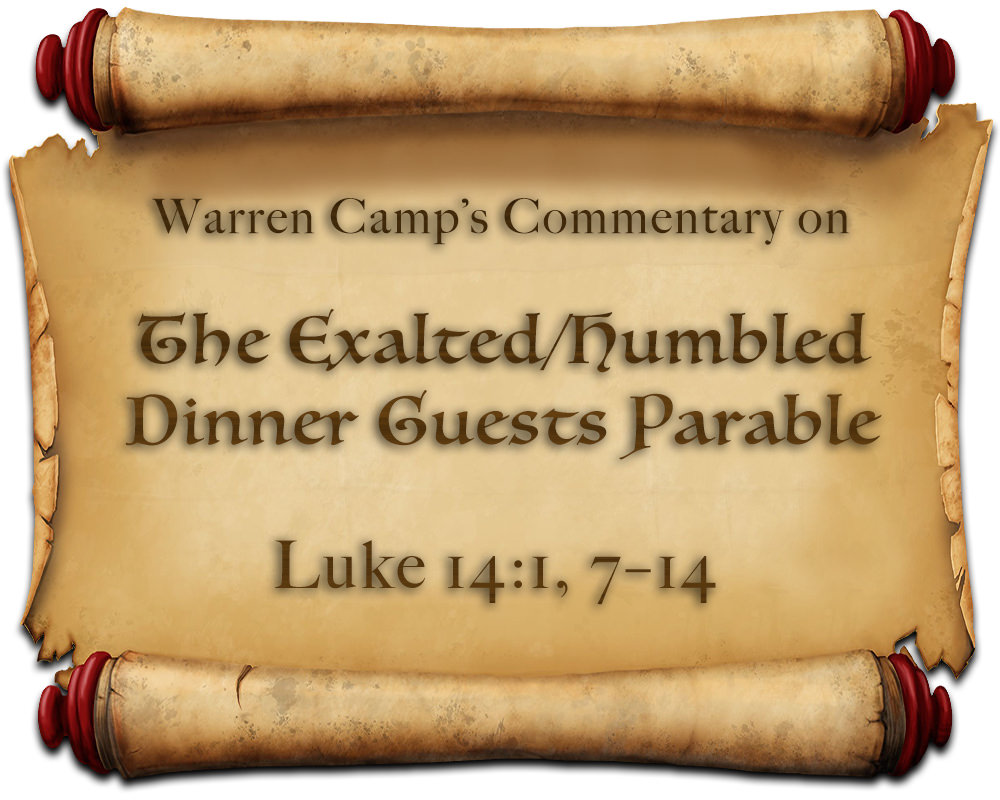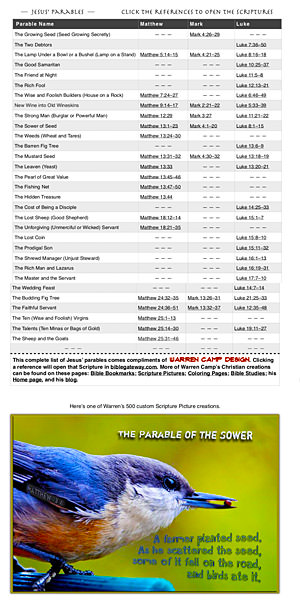This is a two-part parable that’s sometimes called: Parable of the Embarrassed and Exalted, Parable of Humility and Honor; Parable of the Wedding Feast; Parable of the Humiliated vs. Honored; and Parable of Where You Will Sit.
It’s found only in Luke’s gospel where he put it right ahead of the Parable of the Great Banquet (Luke 14:15–24).
Jesus has been on his way to Jerusalem ever since Luke 9:51. Along the way, he heals many and performs exorcisms, especially on the Sabbath, while teaching his disciples and the crowds.
He told these two back-to-back parables at the house of a prominent Pharisee ruler during a banquet to which he’d been invited.
— Preview —


Click the list or the “bird” to enlarge and use Warren’s list of forty-four of Jesus’ parables (a PDF file with links to Scriptures).
par•a•ble [noun] a simple story used to illustrate the meaning of or a moral or spiritual lesson, as told by Jesus in the gospels
synonyms: allegory, moral story/tale, fable
Jesus’ Parable of the Exalted/Humbled Dinner Guests
Luke 14:1, 7–14 NIV
Jesus puts this parable into context in v. 1: “One Sabbath, when he went to dine at the house of a ruler of the Pharisees, they were watching him carefully.” He, too, watched the dinner guests. When he noticed how they intentionally chose to sit at unique places of honor near the head of the ruler’s dinner table, he told this parable.
Clearly, Jesus taught two distinct lessons herein: (1) He spoke to the guests, telling them not to seek places of honor (vv. 7–11) because, in God’s kingdom, “service” is more important than “status.” (2) He told the host not to be exclusive about whom he invites to his dinners (vv. 12–14). For us today, it’s very easy to emphasize our reputation rather than our character. Just as it was in this passage, it can seem more important to us to be “recognized by the right people” than to “live the right kind of life.”
The Parable of the Exalted/Humbled Dinner Guests
— Part 1
Another Parable of Judgment
Here’s a modern retelling of this parable following “McGee and Me! —A Star in the Breaking” (1989)
Chapter 14 opens with Luke telling us that on a Sabbath day, Jesus was invited to dine at the house of a ruler of the Pharisees. Once he’d arrived — having just healed a man who had dropsy while on the way to the house — he told everyone Part 1 of this dinner parable, which the entire section is centered about a meal table and a dinner on the Sabbath. Things started off with a confrontation over the legality of healing a man on the Sabbath (vv. 1–6).
In New Testament times, a wedding was a very sacred and joyous celebratory event. Oftentimes, weddings lasted a week, more or less. When Jesus told this two-part parable, the majority of his listeners easily understood the vision he’d portrayed. He told his audience a story they could easily grasp about a Jewish wedding feast. Both parts of this parables have basically the same meaning: Don’t try to work the system to win honor or reward. Serve humbly and let others — especially God — choose to give you honor or reward as deemed appropriate.
So, Jesus told this parable to the dinner’s invited guests. In his imaginary or hypothetical banquet scene presentation to everyone in the dining room, he noted how dinner guests were jockeying for the most honorable seats at the table (v. 8), the high places reserved for the guest(s) of honor. He said to them, When you are invited by someone to a wedding feast, don’t sit down in the best place because a guest more honorable than you might have been invited by the host. They might then be asked to move to a less honored seat, and thus be disgraced and embarrassed (v. 9). However (and this becomes the point of Jesus first of two dinner banquet parables), if they choose to sit in the lowest place, they might be asked to take a more honored position to their credit (v. 10).
Read what Solomon similarly introduced his readers to in Proverb 25:6–7: Do not exalt yourself in the king’s presence, and do not claim a place among his great men; it is better for him to say to you, “Come up here,” than for him to humiliate you before his nobles.
Jesus at a Pharisee’s House
7When he noticed how the guests picked the places of honor at the table, he told them this parable: 8“When someone invites you to a wedding feast, do not take the place of honor, for a person more distinguished than you may have been invited. 9If so, the host who invited both of you will come and say to you, ‘Give this person your seat.’ Then, humiliated, you will have to take the least important place. 10But when you are invited, take the lowest place, so that when your host comes, he will say to you, ‘Friend, move up to a better place.’ Then you will be honored in the presence of all the other guests. 11For all those who exalt themselves will be humbled, and those who humble themselves will be exalted” (Luke 14:7–11 NIV).
This five-verse advisory doesn’t originate from an ancient thinker’s insight. Rather, this wise and veritable Word of God comes to us through the Holy Spirit’s inspiration. It carries the full measure of God’s authority and truth.
Having Jesus for dinner? What could go wrong? What Jesus observes in this Pharisee’s house reveals a wrong attitude; he therefore tells a parable concerning attitudes. In New Testament times, the closer you sat to the host, the higher you stood on the social ladder and the more attention you’d receive from others. We need to realize that God isn’t impressed by our status in society or his church. Neither is he influenced by what people say or think about us; after all, he clearly sees the thoughts and motives of our heart.
Despite the fact that Jesus shared several meals with Pharisees (7:36), they often complained about his choice of (other) table-fellowship companions (5:30) and about how his associates secured food on the Sabbath (6:1–4). Jesus loved food (7:33–34) and his disciples followed suit (5:33). Just as he expects to care for the physical needs of others (9:13), he expects that others will provide for his disciples when they minister among them (9:3; 10:7–8). In addition, Jesus assumes that friends will share meals (11:5–8; 24:30), which is a natural outgrowth of first-century Jewish culture. Theologically, because he believes that Father God will provide his children with the basics of life, he teaches and acts correspondingly (12:29–31).
However, in chapter 14, Jesus is less interested in the food and more interested in the composition of the banquet. So, he tells a story — a real-life illustration set along side a Biblical truth to make his point about meals and honor. His story emphasizes two components of the banquet setting: (1) the selection of “seats of honor” and (2) the invitation list. In an honor and shame culture, avoiding shame is critical. But we must also look at the converse: Public honor in this parable is to be determined by the host. Honorable distinction may come to those who demonstrate public humility.
What we’ve read is the fourth episode given to us in Luke’s gospel that describes encounters that Jesus had with the Pharisees, regarding the issue of healing people on the Sabbath day (4:31–37; 6:1–9; 13:10–17; 14:1–14). The people attending this parable’s dinner were scrutinizing Jesus because of clashes between Jesus and his opponents about how the Sabbath was to be observed. During the banquet, Jesus healed a man with dropsy (abnormal swelling of the body) even though the scribes (reporters) and Pharisees didn’t answer his question of whether it was lawful to cure on the Sabbath (14:2–4).
Jesus’ teaching is clear and pointed. He brings this to the Pharisees’ attention: If on the Sabbath their acts of love toward injured animals or those that are in danger are acceptable, why then would acts of love for human beings on the Sabbath be any less acceptable?
Jesus disagreed with their lack of charity as a part of Sabbath observance. He made use of the dinner setting, to instruct the guests and the host on the need for humility and charity to inherit God’s Kingdom. And there’s no apparent end to this dispute in the New Testament; the Pharisees pounced upon this often-repeated Sabbath-healing act of Jesus. They saw this as the most sacrilegious and blasphemous thing he did during his earthly ministry.
These Pharisees saw the moral decline of their own nation’s people who’d been moving away from the taught desire to obey God’s law. They called themselves the “set apart ones because they were entirely devoted to keeping every one of God’s Mosaic Laws. Some of the Pharisees were convinced that if they kept the law perfectly for one day, that would induce God to send the long-awaited Messiah. Ironically, that Messiah was standing before them. These men who’d dedicated themselves to the pursuit of righteousness had degenerated into a group of hypocrites.
In all four gospels, we see an extensive ambition among the Pharisees and the scribes. While they attempted to exercise a pompous dominion over other men. It can be the same for us today: It’s constantly the case with men and women who are desirous of empty applause; they cherish envy towards each other; every one endeavors to receive what they imagine to be due to them. John Calvin wrote: “Christ exposed this ambition of theirs to ridicule them with an appropriate parable. If any one sitting at another man’s table were to occupy the highest place, and were afterwards compelled to give way to a more honorable person, it would not be without shame and dishonor that he was ordered by the master of the feast to take a different place. But the same thing must happen to all who proudly give themselves out as superior to others; for God will bring upon them disgrace and contempt (v. 7).”
Joy for the Pharisees amounted to parading their righteousness and holiness — not before God but before the eyes of men. What they craved was recognition and admiration of human beings, not God. But their’s was an exercise in hypocrisy it was a pretense because their righteousness wasn’t sincere or genuine. Jesus will never accept or condone our hypocrisy! [See this list of a number of scribes’ and Pharisees’ hypocrisy characteristics that Jesus revealed in this parable] Sadly, when Christ associated with them they couldn’t stand him. So they resorted to developing an uncontrollable desirer to execute Jesus, the Messiah.
For all those who exalt themselves will be humbled, and those who humble themselves will be exalted. Calvin adds these nuggets of spiritual wisdom: “God is an enemy to all who desire to exalt themselves; all who claim for themselves any merit must of necessity make war with Him. It is a manifestation of pride to boast of the gifts of God, as if there were any excellence in ourselves, that would exalt us on the ground of our own merit. Humility, on the other hand, must be not only an unfeigned abasement, but a real annihilation of ourselves, proceeding from a thorough knowledge of our own weakness, the entire absence of lofty pretensions, and a conviction that whatever excellence we possess comes from the grace of God alone.”
The Parable of the Exalted/Humbled Dinner Guests (Luncheon for the Poor)
— Part 2
A Follow-Up Parable of Judgment
A 2-minute video of Luke 14:1, 7–14 — “Invite the Poor to Your Banquet” — a gospel-lectionary Bible reading (2022)
12Then Jesus said to his host, “When you give a luncheon or dinner, do not invite your friends, your brothers or sisters, your relatives, or your rich neighbors; if you do, they may invite you back and so you will be repaid. 13But when you give a banquet, invite the poor, the crippled, the lame, the blind, 14and you will be blessed. Although they cannot repay you, you will be repaid at the resurrection of the righteous” (vv. 12–14 NIV).
This follow-up parable of the “Luncheon for the Poor” shows that God is extremely kind toward the humble and low-ranking. He doesn’t bless glory seekers. Humility is one of the conditions of God’s grace being bestowed on his children. The more humble we are, the more pleased Father God is with us.
Humility and Hospitality Jesus turned redirected his second parable’s focus from the guests to the host, telling him that if he’d invite the poor, the crippled, the lame, the blind, and people who could never repay him, he’d be showing that he was ministering to them for the Lord’s sake, not his own (vv. 12–14). This doesn’t mean that we should never hospitably invite our family or friends to our homes. He’s simply warning us against entertaining only family and friends. God opens the door to his kingdom to everyone.
While the words of our Lord in vv. 7–14 should be seriously taken and applied in a literal way, let’s remember that Jesus was speaking a parable (v. 7, cf. v. 12). It and its principle are thus to be much more broadly applied.
“But when you give a banquet, invite the poor, the crippled, the lame, the blind, and you will be blessed. Although they cannot repay you, you will be repaid at the resurrection of the righteous” (vv. 13–14). Jesus taught and acted differently from rabbis. In contrast to widespread belief, Jesus considered “the poor, the crippled, the lame, and the blind” as people dear to God. Though Jesus didn’t have the financial ability to offer dinners for people in need, he offered them much more than a banquet when he continued to heal those in need. When you invite the needy to your home for dinner, God will repay you appreciably.
Jesus also presents another obvious message in this follow-up parable: That formal banquet for the poor that Jesus has described ought to remind us of Father God’s personal invitation to us to enter his kingdom. He’s invited us to come into his home and break bread with him for the rest of time. Realize, too, that we are the spiritually poor, crippled, lame, and blind. Not one of us can ever repay our most generous, grace-filled God.
A Hearty Way to Approach and Apply This Parable
Herein, Jesus says that it’s better to humbly take a seat that provides the least honor. It might result in the host beckoning you to a better, more honorable seat. So, rather than being shamed as a result of trying to exalt yourself, you’d be honored in front of all the other guests.
Throughout the New Testament, Jesus demonstrated convincingly that humility is the best course of action (Matthew 18:4; 20:26–28; and 23:12). He exhorted a behavior of humility in several epistles (James 4:6, 10; Philippians 2:3; and 1 Peter 5:5).
When planning a banquet, the temptation is to invite those who are most likely to you good in return. Thus, one thinks first of inviting family members or rich friends, who’ll reciprocate in kind. We’re tempted to “give so we can get.” Jesus taught that this practice should not only be revised but reversed. In God’s economy, human rank means nothing! Men and women must be gracious to the helpless and those who can’t pay them back, so that when God’s kingdom is established on the earth (when the righteous are resurrected), God may reward them. Thus, Jesus advocated inviting as “guests” at our next banquet the poor, the crippled, the lame, and the blind (v. 13). Doing so assures us of God’s blessings in heaven.
In Jesus’ two-part parable, he points to a system of providing generous and loving hospitality to those in need without expecting repayment. Generosity from the heart — with no other motive — is what pleases God. Those who voluntarily extend such generosity, Jesus said, will be blessed and repaid in the life to come, precisely because, in this world, embracing the poor is of no social use or utility; they can’t afford to repay you., neither can they promote your own self-advancement. Remember though that such reward shouldn’t become our motivation. Clearly, our overt acts of kindness and sacrifice to the needy demonstrate to the world Jesus’ love and his mercy; such humble and hospitable acts become the fruit of our efforts and our love for our Lord.
The lesson of this parable is clear. God calls us to adopt kingdom values; he blesses us when we seek to please God, rather than other people. Whom do you want to please? The world? Or the Lord of the world?
“But when you give a banquet, invite the poor, the crippled, the lame, the blind, and you will be blessed. Although they cannot repay you, you will be repaid at the resurrection of the righteous” (Luke 14:13–14).


